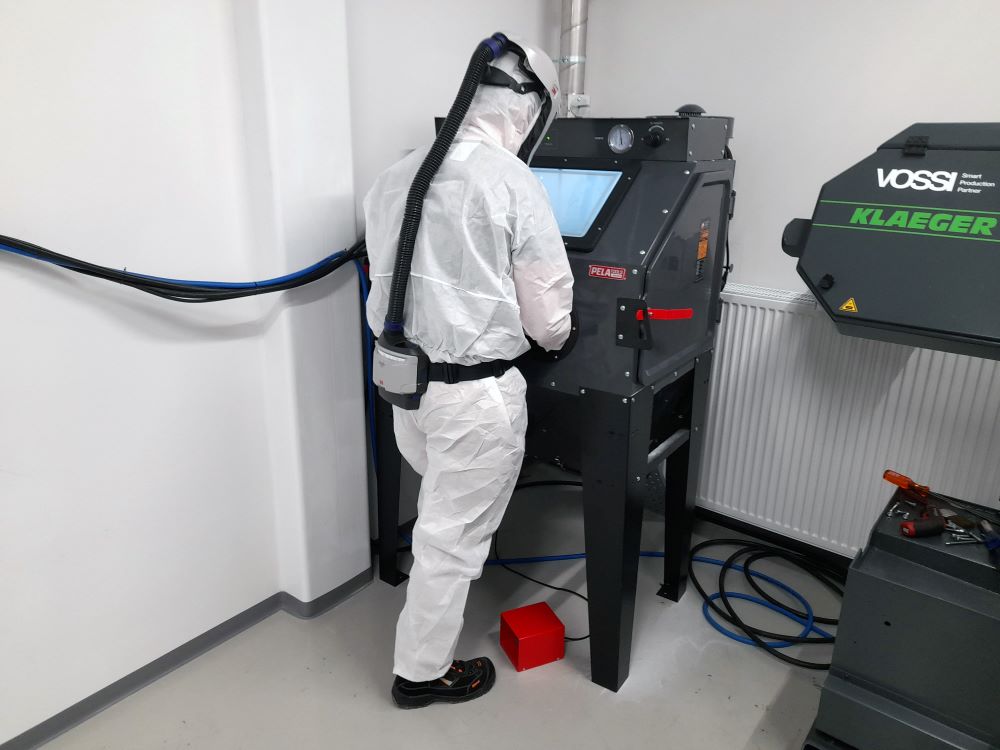May 2, 2024
The 3.9 million AMAze project aims for boosting the overall production capacity of Additive Manufacturing facilities through developing novel solutions for post processes automation, quality control automation, traceability of parts, and data management.
Additive manufacturing is increasingly moving from individual printers to production lines and printer farms. This will increase the importance of software and automated solutions. Many automation solutions are available for the production and printing phase, but no solutions are specifically addressing post-processing automation. Finnish companies are tackling this change through the AMAze project (Additive Manufacturing Post-processing Automation), where the solutions being developed aim to be among the first to market.
“Currently, around 60 percent of the price of parts for additive manufacturing comes from the cost of the manual work during the post-processing steps, such as cleaning the parts from the extra powder, moving parts from one machine to another, separate different parts, and quality control. This limits the uptake of additive manufacturing. In the AMAze project, we will bring solutions to this problem that are not yet available internationally,” says Mrehan Elshehawy, Project Manager at DIMECC Ltd.
The market for additive manufacturing is split with a market share of around 60 % for hardware sales and around 40 % for software and services.
There are a limited number of companies specializing in post-processing technologies and they usually focus on one area or stage of post-processing, such as print dyeing. Furthermore, the solutions are not suitable for industrial and large scale production due to size limitations. There are no multi-stage and fully automated post-processing solutions. There is a particular need for more sophisticated software systems, powder removal solutions and a combination of several automation methods.

Part of Valmet’s Beyond Circularity
The companies involved in the project are Valmet, a developer of process technology and automation and services for the pulp, paper and energy industries; 3D Formtech, an AM service provider focusing on industrial plastic and metal components; Materflow, an industrial component manufacturer of 3D-printed plastic and metal parts; Advian Sofware Oy, a software company developing a modular Edge AI platform and Edge AI applications for industrial use; and Fastems Oy, a leading provider of CNC automation solutions.
“At Valmet, we have utilized additive manufacturing (AM) since 2016 when we introduced our first printer. In September 2023, we opened the second Additive Manufacturing Technology Center in Tampere, Finland. It’s crucial to continue improving this technology and its productivity, so we are looking to good collaboration and results on the AMAze project. During the project, we aim to explore opportunities for enhancing post-processing, including what can be achieved through automation. Another area we want to develop further and accelerate is post-print quality assurance. This project is also a part of Valmet’s Beyond Circularity R&D program and ecosystem, which aims to enable our customer industries to shift to carbon neutrality and facilitate the green transition,” Marke Kallio, RTD Manager, Performance Parts explains the company’s involvement in this project.
Tampere University of Applied Sciences (TAMK) investigates the use of automation and data solutions in post-processing for additive manufacturing and looks for environmentally sustainable solutions for powder removal.
“In addition, the AMAze project develops solutions for collecting product data, such examples of the use of the forthcoming digital product passport for the additive manufacturing sector,” says Katri Salminen, Project Manager at TAMK.
The two-year project has a budget of €3.9 million. It is financed by Business Finland and the participating companies. AMAze is the initiative of the FAME Ecosystem, which brings together the organizations of the whole Additive Manufacturing value chain.
More information:
Mrehan Elshehawy, Project Manager, DIMECC Ltd., mrehan.elshehawy(at)dimecc.com +358 40 840 0201
